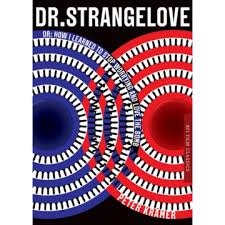Dr. Strangelove: BFI Film Classics by Peter Kramer (book review).
In many ways, ‘Dr. Strangelove Or: How I Learned To Stop Worrying And Love The Bomb’ (1964) was meant to show the absurdity of the Cold War between the USA and the USSR and its no-win situation with its mutually assured destruction. Stanley Kubrick wasn’t the first director to do a film on the situation, using the 1958 novel ‘Two Hours To Doom’ (UK Title: ‘Red Alert’) as his template but he was the first to turn it into a satire. A reminder about satire is showing a serious situation in a ridiculous manner can often make people review just what the original argument was about and seek a better solution. Although I doubt this would be attributed to ‘Strangelove’, the fact that the only thing the USA and USSR agreed on was not to let their smouldering hostilities tip the balance into all out-war. Kubrick also wanted to explore the options that would be discussed in the war room should something happen and not to leave things totally in the hands of either the military or scientists.
According to author/critic Peter Kramer, Kubrick really wavered between the two options of drama and black comedy for a long while. Even though there are still some rumblings of the Cold War building up again, of the earlier films, ‘Dr. Strangelove’ was surely the one that struck the hearts of the people back then. Not because of the fear of consequences but how the little things could put us over the edge. As Kramer points out in his conclusion, Kubrick wanted to do a more uplifting film after this one and did something called ‘2001: A Space Odyssey’. When you consider that the shuttle approach to the space wheel went past a nuclear device in orbit and at the end of Clarke’s novel that the Star-Child detonated said bomb above the Earth, you have to wonder just how much was still in Kurbick’s worry list.
I should point out that there were only one other films exploring this theme. ‘Red Alert’ (1962) is the one Kramer points out but a Net check shows him in error and I think he actually mean the 1964 film ‘Fail-Safe’ starring Henry Fonda. If you want to see a serious implication film, watch this one. We were shown this film as a ‘treat’ at the end of term when at school and it left all of us somewhat moved at this dilemma at the end.
What Kramer really focuses on with this large pocket-size book is the phallic undertones as he goes through the action of the film. Considering that there is only one actress in the entire film, Tracy Reed (you might remember her in the ‘UFO’ episode ‘The Dalotek Affair’), the implication is that a nuclear war would be fought over testosterone spiced with macho. It’s a shame really that we don’t really see more of how the Russians were reacting in this film while all this was going on or indeed in real life after the film’s release. Showing the concerns over how the west would do things would surely have worried the Soviets at the time and how much of a knife-edge or button press things could really escalate.
If you’re looking for an analysis of the casting choices, like Peter Sellers being selected for four roles, then this book might not be for you. From my recollections, Kubrick only needed one comic actor although the rest of the cast were hardly straight men to him. Seeing the implication of name choices seems more to be more a reminder of the satire and how much you should be paying attention to everything on screen.
Although there have been films since, often showing the results of a nuclear holocaust than what leads up to it, with the exception of ‘Whoops! Apocalypse’ (TV series: 1982 and film 1988), which was clearly done for laughs(!), ‘Dr. Strangelove’ still remains the black satire that we would all dread to happen. One can only hope there are better people with a limited number of nukes behind the triggers these days.
GF Willmetts
November 2014
(pub: BFI/Palgrave MacMillan. 114 page illustrated small enlarged paperback. Price: £12.99 (UK). ISBN: 978-1-84457-788-1)
check out websites: www.bfi.org.uk and www.palgrave.com

